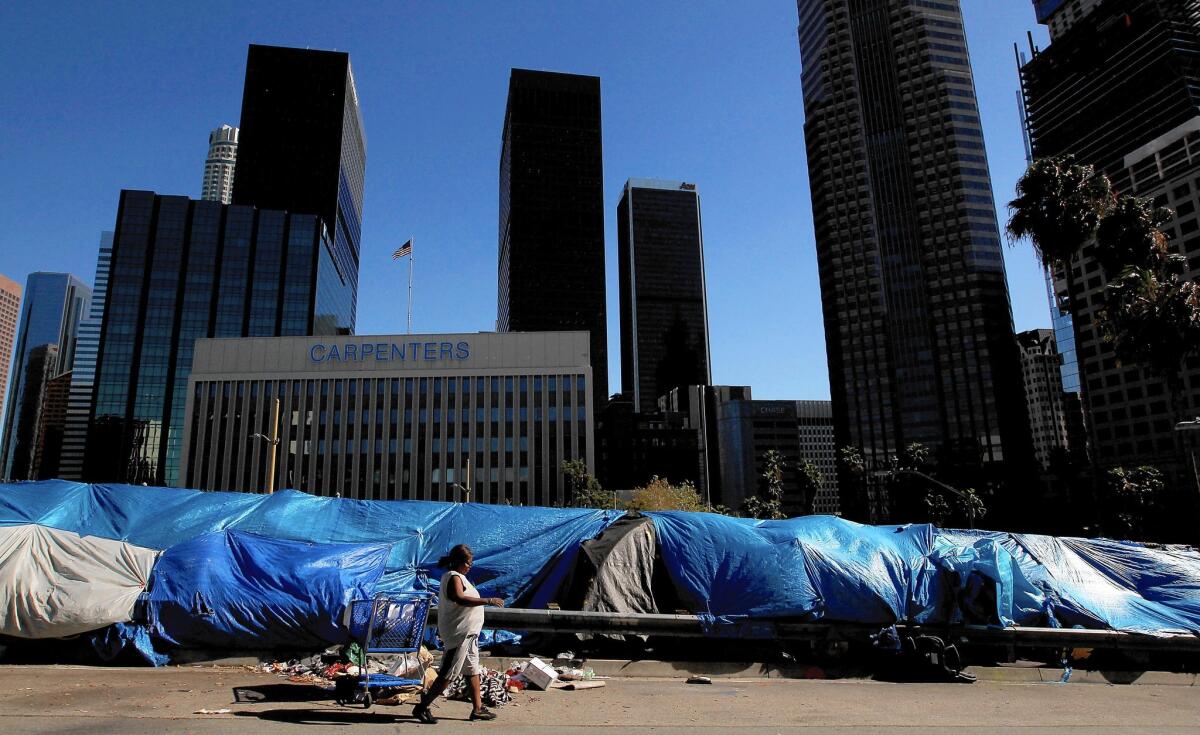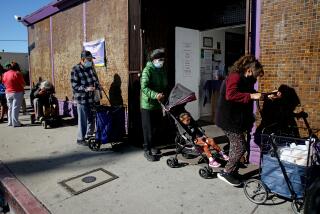L.A. County supervisors vote to build $100-million affordable housing fund

Shown is a homeless encampment in downtown L.A. at Beaudry Avenue and 6th Street. Los Angeles County supervisors voted Tuesday to put up to $100 million a year into a fund for affordable housing.
- Share via
To address growing homelessness in the region, Los Angeles County supervisors voted unanimously Tuesday to gradually set aside up to $100 million a year to construct and maintain affordable housing.
The move was hailed by business leaders, anti-poverty advocates and nonprofit housing developers, but the price tag drew concerns from some about whether the county can afford it.
Supervisors Sheila Kuehl and Mark Ridley-Thomas proposed creating the housing fund, which will start with $20 million next year. The county’s annual contribution will grow over the next five years until it reaches $100 million.
Supervisor Don Knabe initially objected, saying the county faces uncertainties and other potential big-ticket spending requirements over the next five years, including federal requirements for reform in the county jails.
Rather than setting aside a set dollar figure, Knabe proposed that the county tap 20% of the money left over at the end of each budget year, which he estimated would come out to $28 million a year, for the next five years. After that, the county would set aside 20% of property tax revenues that would have gone to redevelopment agencies before the state dissolved them in 2012.
The supervisors agreed to have the county’s chief executive officer at least take a close look at Knabe’s funding formula as a means of paying for the program.
Kuehl said the affordable housing money is one piece of a larger plan to address poverty and homelessness.
“This is not the be-all and end-all of our approach to housing and homelessness.” The action, she said, is “a way of trying to build for a future where people will be able to afford their housing and therefore will not lose it and become homeless.”
The debate over how to pay for the initiative took place against the backdrop of last year’s election, which ushered in a new, more liberal board majority with plans for ambitious social programs. But Knabe expressed a fear that the proliferation of new projects would weaken the county’s often-touted history of fiscal restraint.
The county action comes as Los Angeles Mayor Eric Garcetti announced that the city will consider imposing new fees on developers to subsidize affordable housing within the city limits. Both the city and county are working on a larger strategy to address the area’s homeless population of 44,000.
The supervisors did not say where the money would come from, but directed the county chief executive to come back with a plan as part of next year’s budget process. The county has a total annual budget of $28 billion, but much of it goes to programs it administers on behalf of the state and the federal government.
Knabe argued his approach was more prudent, while Kuehl and Ridley-Thomas — backed by a coalition of affordable housing developers and advocates — said the county needs to put more resources into addressing the short supply of low-cost housing that is contributing to Los Angeles’ growing homelessness problem.
Knabe, who eventually voted along with the other supervisors in favor of the housing fund, initially expressed irritation at “taking just numbers out of the sky” without knowing how the program would be paid for. He said his approach would ensure the county will continue to have money to support the housing programs. “The most important piece of all this is sustainability,” he said.
“The objective is to get moving and moving now on building more affordable housing, and the formula, the methodology can and will be worked out,” said Ridley-Thomas. “... We are not moving fast enough keeping up with the crisis that has enveloped us.”
Sofya Preger, a formerly homeless county resident now living in supportive housing, told the supervisors: “People are spending 90% of their income just to stay housed. Something like a car accident will put them into homelessness.”
Increasing the amount of affordable housing available will help keep those people in housing, she said.
Jerry Neuman, co-chair of Home for Good, a joint project of United Way of Greater Los Angeles and the Los Angeles Area Chamber of Commerce to address homelessness, said in the long run, housing people will save the county money on law enforcement and services.
“This is more than a moral imperative. It is an economic one,” he said.
In addition to building and maintaining affordable housing, some of the money could go to rental subsidies and programs to help families find housing. The board asked a group of county administrators responsible for housing, health, law enforcement, child welfare, social services and land use planning to analyze the county’s gaps in affordable housing and where the money would best be spent.
Kuehl had prevously said she had “no doubt” that the county can put $20 million toward affordable housing next year and $40 million the following year without cutting into other programs. The $100-million figure could be scaled back if the economy takes a dive, she said.
“I see this all as a unity as far as our anti-poverty approach,” Kuehl had said, pointing to other county initiatives on homelessness, and the diversion of mentally ill jail inmates.
Alan Greenlee, executive director of the Southern California Assn. of Nonprofit Housing, pointed to a recent study that found Los Angeles County needs more than 527,700 additional affordable rental homes to meet the needs of families at the bottom of the income scale. He voiced support for the proposal by Kuehl and Ridley-Thomas.
“It’s just a more aggressive, more ambitious proposal that will bring sorely needed financial resources for development of affordable housing,” Greenlee said.
Hoy: Léa esta historia en español
ALSO:
In Bruce Lee-like move, Northern California police department to adopt nunchakus
Flytenow, the aviation version of Uber and Lyft, is locked in court battle with regulators
By mounting Maywood Music Festival, young artists find a way to fit in
More to Read
Sign up for Essential California
The most important California stories and recommendations in your inbox every morning.
You may occasionally receive promotional content from the Los Angeles Times.














